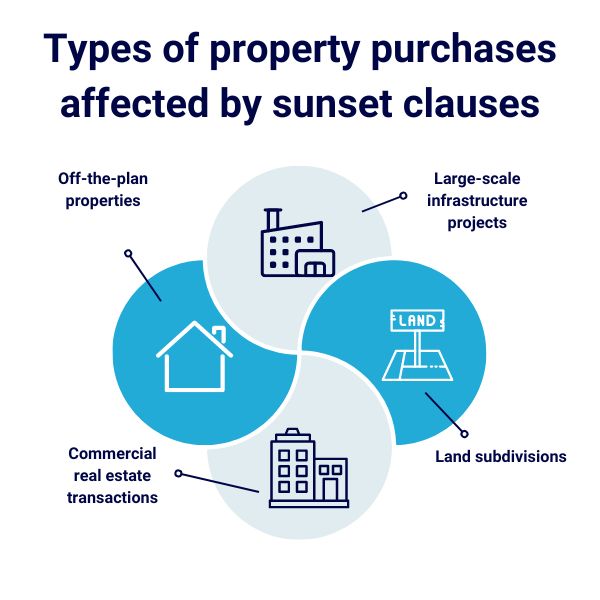To protect the interests of the buyer and the seller in property transactions, the contract of sale will feature a sunset clause, otherwise known as a sunset date, that specifies how long the contract of sale is valid for.
This legal provision is increasingly serving as a pivotal element, particularly when it comes to buying off-the-plan properties in Australia. For those involved in the sale or purchase of real estate, understanding the intricacies of the sunset date and how it can affect the contract of sale is crucial.
Table of contents
- What is a sunset clause?
- Potential abuse of the sunset clause by property developers
- Qi Wang v. Kaymet Corporation Pty Limited [2016] NSWSC 742
- Jobema Developments Pty Limited v Zhu [2016] NSWSC 3
- How the sunset clause can benefit buyers
- Types of property purchases affected by sunset clauses
- Conclusion
What is a sunset clause?
The sunset clause or sunset date sets a predefined time frame for sellers and buyers for completing a property transaction. The built-in deadline, which is especially crucial for off-the-plan sales which may be subject to lengthy delays, compels the buyer and the seller to finalise the sale within the stipulated time frame or risk being in breach of the contract for sale.
In most cases, the sunset date will be negotiated by both parties before agreeing to the contract. The clause becomes active once both parties have signed the contract for sale ensures that both the seller and buyer have a clear understanding of timeframes.
For sellers, the implication of a sunset date is clear – the property must be vacant and ready for the buyer to move in on the date specified in the contract of sale. For buyers, the clause ensures that buyers secure financing in time and settle the purchase price within the specific time frame.
If either party fails to meet their obligations within the timeframe set forth in the sunset clause, then the contract may be terminated, voiding the deal, and potentially returning the property to the market.
Potential abuse of the sunset clause by property developers
The sunset clause is designed to offer a clear timeline for property developers when selling off-the-plan properties. However, in Australia’s fiercely competitive and fast-moving property market, its application from property developers can sometimes veer into exploitation.
Qi Wang v. Kaymet Corporation Pty Limited [2016] NSWSC 742
A recent, notable example of how property developers have used the sunset clause to unfairly harm buyers is the case of Qi Wang v. Kaymet Corporation Pty Limited [2016] NSWSC 742.
In this instance, a group of 34 first-time home buyers faced a harsh outcome when the developer invoked the sunset clause. In this case, property values had soared by over 75% since buyers initially put forward their deposit on the properties. The court’s decision to side with the developer led to a significant financial loss for the buyers who not only missed out on the market’s financial gains but also incurred hefty legal expenses, demonstrating a stark imbalance in the power dynamic between developers and buyers.
Jobema Developments Pty Limited v Zhu [2016] NSWSC 3
Similarly, in the case of Jobema Developments Pty Limited v Zhu [2016] NSWSC 3, the developer attempted to rescind contracts under the sunset clause following construction delays. The developers then attempted to renegotiate the sale prices for the properties in a property market that had significantly increased in value and competition since buyers first paid their deposit. In this case, the court ruled in favour of the purchasers and lamented the important role that the judicial system plays in safeguarding the interests of buyers.
Both of these cases, which are just two examples of the numerous similar instances in recent years, highlighted the potential abuse of the sunset clause by developers and the significant disadvantage that it placed buyers at in Australia’s incredibly volatile, fast moving real estate market.
How the sunset clause can benefit buyers
For buyers, the sunset clause provides protection throughout the property transaction and affords added flexibility.
Primarily, the clause serves as protection which buyers may be able to leverage where properties – particularly those purchased off the plan, may be subject to delays.
In instances where a property developer fails to complete the project by a specified date, the clause entitles buyers to legally withdraw from the contract. For projects faced with exceptionally long delays, such as those through the recent pandemic where materials and worker shortages caused unprecedented, industry-wide delays, the clause empowers buyers to seek other options.
In addition to safeguarding buyers in the instance of off-the-plan delays, the clause can also be used to the benefit of sellers who may face trouble in selling another property that will be used to leverage the purchase. In this instance, the sunset clause provides buyers with the comfort of knowing that they may exit the contract of sale without significant financial repercussions if they are unable to sell their property.
Types of property purchases affected by sunset clauses
The sunset clause is most notably associated with the purchase of off-the-plan properties. For pre-construction properties that are being purchased based on plans and specifications, the stipulation is crucial for protecting the rights of buyers. Beyond its application in off-the-plan property transactions, the sunset clause is also applied in a range of different contracts including large scale infrastructure projects, commercial real estate transactions, and in land subdivisions.
The diverse application of sunset dates in real estate and property transactions underscores the versatile and important inclusion and application of the clause.
Conclusion
The application and indeed inclusion of the sunset clause across different property transactions highlights its importance in Australia’s uniquely competitive real estate market. For buyers and for sellers, the sunset date in contracts provides peace of mind that property deals are concluded within a reasonable time frame. To learn more about the legal documentation and forms required for buying and selling, get in touch with the expert conveyancers at Entry Conveyancing. Australia’s leading team of property experts, our conveyancers in Sydney and Melbourne are here to make your property transaction seamless.






